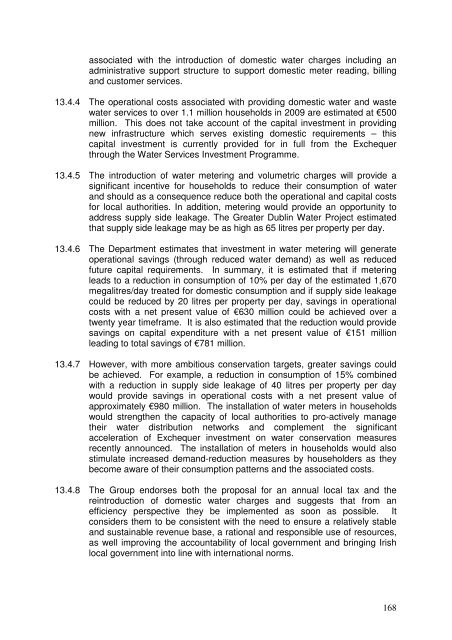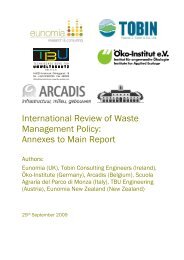Report of the Local Government Efficiency Review Group
Report of the Local Government Efficiency Review Group
Report of the Local Government Efficiency Review Group
Create successful ePaper yourself
Turn your PDF publications into a flip-book with our unique Google optimized e-Paper software.
associated with <strong>the</strong> introduction <strong>of</strong> domestic water charges including an<br />
administrative support structure to support domestic meter reading, billing<br />
and customer services.<br />
13.4.4 The operational costs associated with providing domestic water and waste<br />
water services to over 1.1 million households in 2009 are estimated at €500<br />
million. This does not take account <strong>of</strong> <strong>the</strong> capital investment in providing<br />
new infrastructure which serves existing domestic requirements – this<br />
capital investment is currently provided for in full from <strong>the</strong> Exchequer<br />
through <strong>the</strong> Water Services Investment Programme.<br />
13.4.5 The introduction <strong>of</strong> water metering and volumetric charges will provide a<br />
significant incentive for households to reduce <strong>the</strong>ir consumption <strong>of</strong> water<br />
and should as a consequence reduce both <strong>the</strong> operational and capital costs<br />
for local authorities. In addition, metering would provide an opportunity to<br />
address supply side leakage. The Greater Dublin Water Project estimated<br />
that supply side leakage may be as high as 65 litres per property per day.<br />
13.4.6 The Department estimates that investment in water metering will generate<br />
operational savings (through reduced water demand) as well as reduced<br />
future capital requirements. In summary, it is estimated that if metering<br />
leads to a reduction in consumption <strong>of</strong> 10% per day <strong>of</strong> <strong>the</strong> estimated 1,670<br />
megalitres/day treated for domestic consumption and if supply side leakage<br />
could be reduced by 20 litres per property per day, savings in operational<br />
costs with a net present value <strong>of</strong> €630 million could be achieved over a<br />
twenty year timeframe. It is also estimated that <strong>the</strong> reduction would provide<br />
savings on capital expenditure with a net present value <strong>of</strong> €151 million<br />
leading to total savings <strong>of</strong> €781 million.<br />
13.4.7 However, with more ambitious conservation targets, greater savings could<br />
be achieved. For example, a reduction in consumption <strong>of</strong> 15% combined<br />
with a reduction in supply side leakage <strong>of</strong> 40 litres per property per day<br />
would provide savings in operational costs with a net present value <strong>of</strong><br />
approximately €980 million. The installation <strong>of</strong> water meters in households<br />
would streng<strong>the</strong>n <strong>the</strong> capacity <strong>of</strong> local authorities to pro-actively manage<br />
<strong>the</strong>ir water distribution networks and complement <strong>the</strong> significant<br />
acceleration <strong>of</strong> Exchequer investment on water conservation measures<br />
recently announced. The installation <strong>of</strong> meters in households would also<br />
stimulate increased demand-reduction measures by householders as <strong>the</strong>y<br />
become aware <strong>of</strong> <strong>the</strong>ir consumption patterns and <strong>the</strong> associated costs.<br />
13.4.8 The <strong>Group</strong> endorses both <strong>the</strong> proposal for an annual local tax and <strong>the</strong><br />
reintroduction <strong>of</strong> domestic water charges and suggests that from an<br />
efficiency perspective <strong>the</strong>y be implemented as soon as possible. It<br />
considers <strong>the</strong>m to be consistent with <strong>the</strong> need to ensure a relatively stable<br />
and sustainable revenue base, a rational and responsible use <strong>of</strong> resources,<br />
as well improving <strong>the</strong> accountability <strong>of</strong> local government and bringing Irish<br />
local government into line with international norms.<br />
168
















